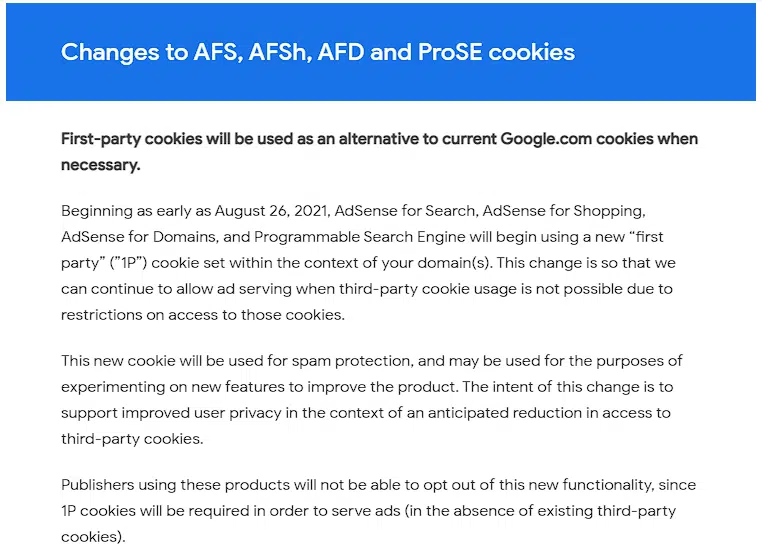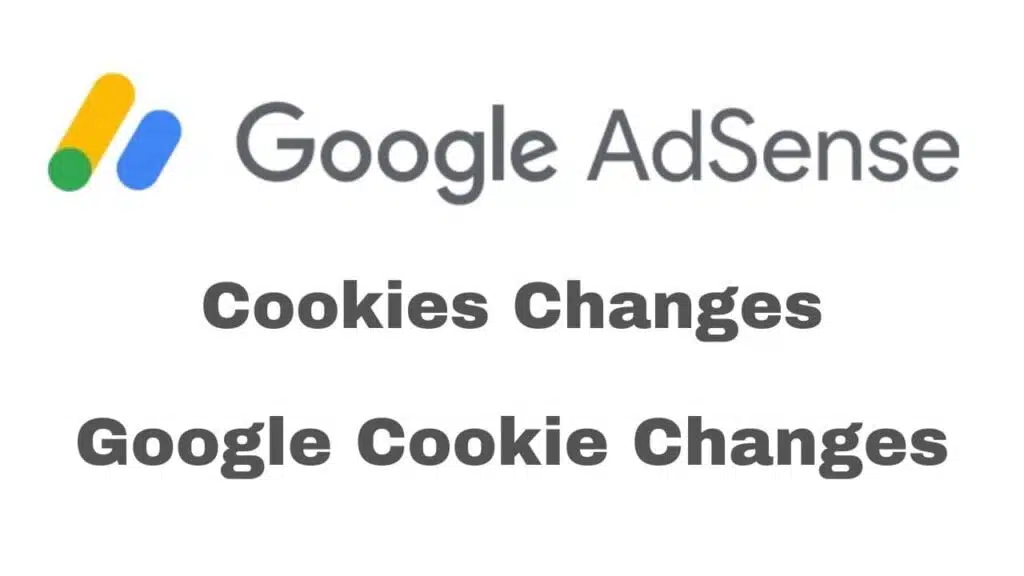Google Adsense Cookie Changes to Cookies used for Search/Shopping & Programmable Search Engine. AdSense Cookie changes will be for Search/Shopping & Programmable Search Engine Cookie Changes.
Related: Adsense Optimized ad Code
Table of Contents
Changes to AFS, AFSh, AFD and ProSE cookies
First-party cookies will be used as an alternative to current Google.com cookies when necessary.
Beginning as early as August 26, 2021, AdSense for Search, AdSense for Shopping, AdSense for Domains, and Programmable Search Engine will begin using a new “first party” (”1P”) cookie set within the context of your domain(s). This change is so that Google can continue to allow ad serving when third-party cookie usage is not possible due to restrictions on access to those cookies.
This new cookie will be used for spam protection and may be used for the purposes of experimenting with new features to improve the product. The intent of this change is to support improved user privacy in the context of an anticipated reduction in access to third-party cookies.
Publishers using these products will not be able to opt-out of this new functionality, since 1P cookies will be required in order to serve ads (in the absence of existing third-party cookies).
What are cookies?
Cookies are the text file that stores data like usernames & passwords, which are helpful to identify the Devices / Computers when connected to External Network. eg. the Internet, World Wide Web, etc.
Google Adsense Cookie Changes Update
Google recently, sent notifications to publishers about their changes in Adsense cookies. on August 2, 2021, Google mailed publishers about AdSense for Search/Shopping & Programmable Search Engine Cookie Changes.
Basically, Google Adsense uses third-party cookies that help them to serve ads or personalized ads. The cookies collect users’ data, and search history while users browse the web.
Advertisement companies also use cookies to serve personalized ads based on the user’s browsing behavior and help advertisers to show relevant ads to the users. The cookies also help google prevent from showing the same ads repeatedly.

Different types of cookies – Magic Cookies and HTTP Cookies
There are generally two different kinds of cookies
- Magic Cookies
- HTTP Cookies
How does AdSense use cookies?
Google Adsense generally uses cookies to improve its advertising. The cookies help google track users browsing history and show relevant ads to users accordingly.
Google Adsense also uses Cookies to track and also to avoid showing the same ads again and again to the same user who has already seen that particular ad.
Cookies themselves do not contain any personally identifiable information. So there are no security vulnerabilities.
Publishers can Opt-out of ads personalization
If Publishers don’t want to see any personalized advertisements from google then users may opt out of ad personalization using Google’s Ads Settings.
When does AdSense send cookies to a browser?
Google Adsense sends cookies to the user’s browser after getting any Impressions, clicks, or any other activity that may result to connect to Google servers.
In General, Google Adsense sends cookies to a browser only when users visit any page that has google ads. Any Pages, Articles, or posts with Google ads including ad tags that instruct web browsers to fetch ad contents from google AdSense ad servers.
Notify users about cookies
All Publishers must have a privacy policy page that notifies website visitors about the uses of cookies on the website, and about Google Adsense Cookie Changes.
Also If publishers are collecting any specific information from the website visitors then they must also comply with applicable laws regarding collecting information from site visitors.
Without user Consent, publishers are not allowed to use any cookies on their website.



7 Comments
Hope now spam will be much lesser.
Yes for sure now there will be less spam as google said, “This new cookie will be used for spam protection and may be used for the purposes of experimenting on new features to improve the product”.
Do we need to make any changes on our website?
No, Publishers don’t need to make any changes on their website.
Should I Disable ad personalization? What would you recommend?
There’s very less likely that publishers would like to disable ad personalization. As ad personalization helps advertisers to show relevant ads to site visitors. And thus would also help to increase CTR.
Hello, Great Thanks for sharing awesome info. I really love to read your blog. I got a lot of information.